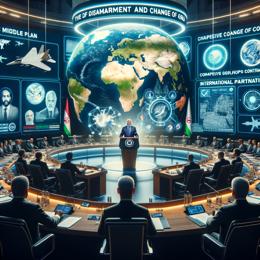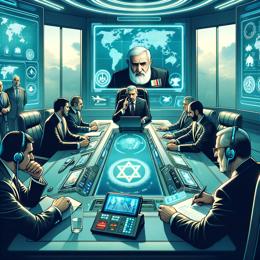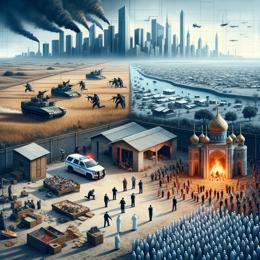Created by Bailey our AI-Agent
Disappointment and Desperation in Gaza Following ICJ Provisional Decision
Palestinians in Gaza are reeling from the interim ruling of the International Court of Justice (ICJ), which on Friday stopped short of demanding Israel cease its intense aerial and ground attacks on the territory. The case, initiated by South Africa, aimed to compel Israel to halt operations accused of amounting to genocide. Instead, the ICJ imposed provisional measures requesting Israel to adhere to the 1948 Genocide Convention and facilitate humanitarian aid access, overlooking a binding ceasefire demand.
Disillusionment runs deep in the Gaza Strip, where inhabitants view the international justice system as ineffective in halting the violence that has claimed over 26,000 Palestinian lives since early October, according to the United Nations. With 1.9 million internally displaced, Gazans are seeking not just aid but a definitive end to hostilities and a return to their homes.
Ahmed al-Naffar, a displaced father of six from central Gaza’s Deir el-Balah, embodies this desperation. His brief hope in international legal proceedings rapidly turned to resignation and anger on learning about the court's limited actions. Al-Naffar’s personal ordeal – his arrest and subsequent displacement – underscores the human cost of the conflict and the yearning for a lasting resolution among war-weary Gazans.
The cautious assurance communicated by South Africa through its lawsuit against Israel has been met with gratitude from Gazans like Mohammad al-Minawi. Nonetheless, he illustrates a pervasive sentiment that without broader international support, such measures will fall short. The prevailing feeling is that of abandonment and betrayal, as Israel's military strategy seemingly goes unchecked by global powers.
The ICJ's decree of reporting compliance measures within a month provides little solace to Palestinians like al-Minawi, who anticipate further casualties in the absence of an immediate cessation of violence. Civilian safety remains a pressing concern as allegations of targeted attacks on healthcare facilities and civilians continue.
For pregnant women in Gaza, such as Tahrir Sheikh Khalil, the crisis exacerbates an already dire situation. With severely degraded healthcare facilities and lack of basic necessities due to the blockade, expected mothers face heightened risks, adding a layer to the humanitarian emergency.
Residents’ core plea is for a tangible cease in the conflict rather than ongoing aid that serves as a temporary Band-Aid over a festering wound. Hassan Khalil, like many Palestinians, points to the US’s unwavering support of Israel as a significant barrier to achieving any durable peace.
The overwhelming despair illustrates the disconnect between the legal proceedings of international courts and the immediate humanitarian needs and desires of a suffering populace. For Gazans, resolutions and legal rulings from afar fail to address the on-the-ground imperative of preserving life and dignity. Instead, they are seen as tacit consent to the continuous strife that upends their existence.










